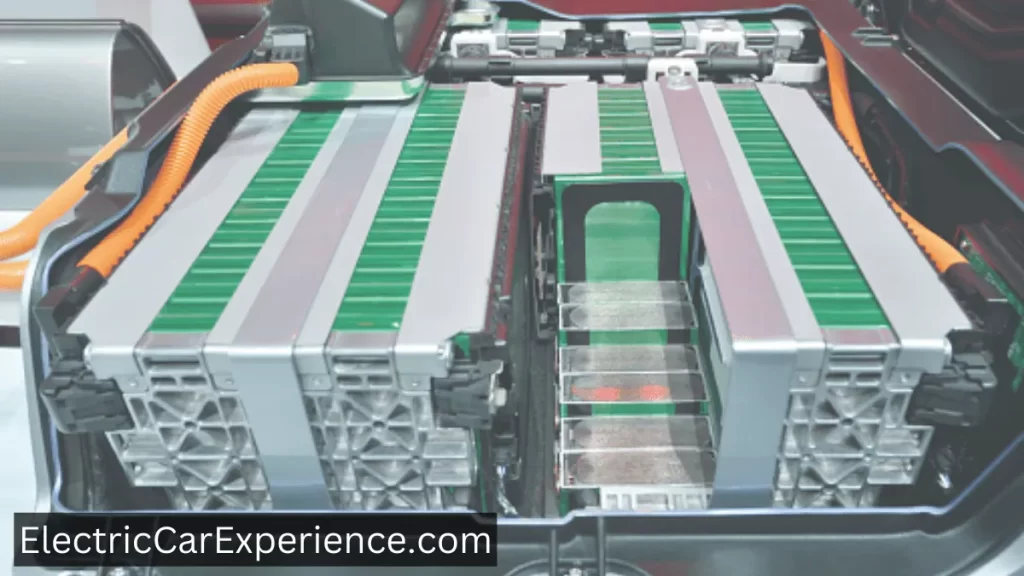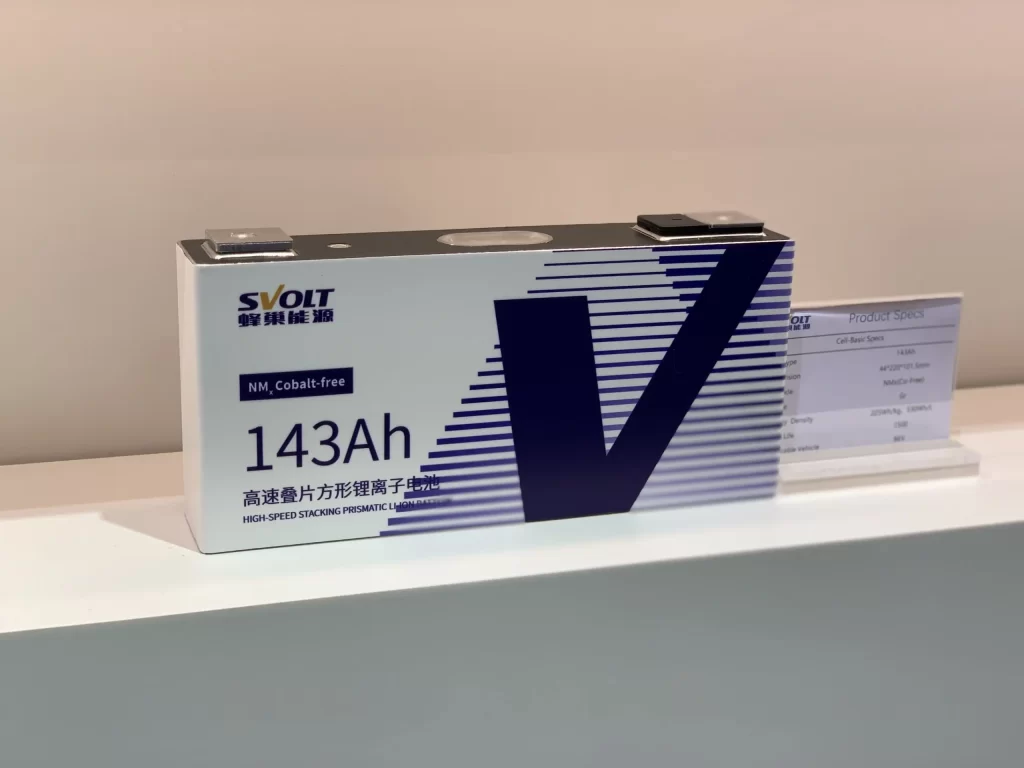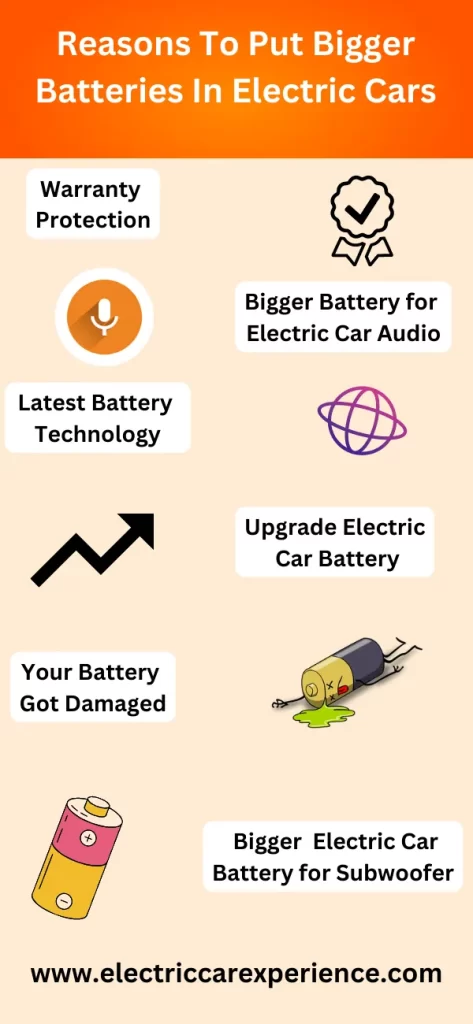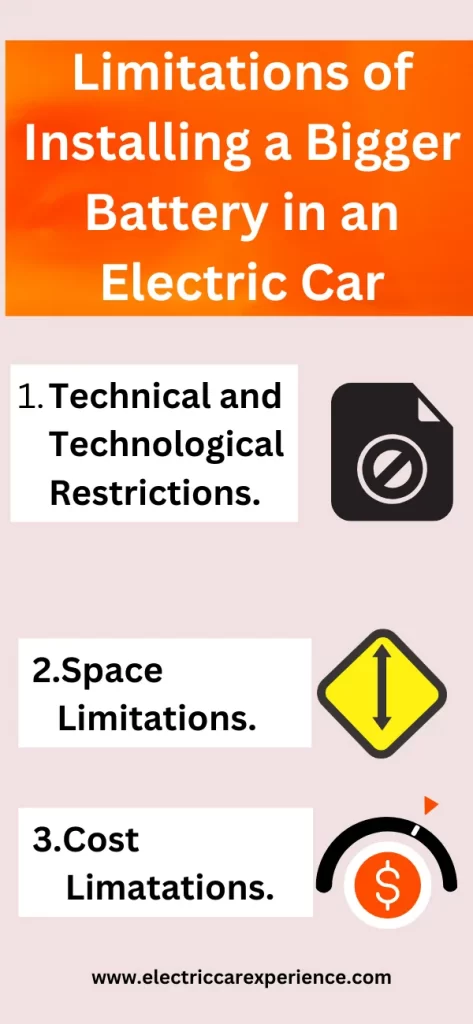
Electric cars are gaining more and more popularity each day because electric vehicles are more environmentally friendly than conventional gasoline or diesel vehicles. Still, the biggest issue that users face is range anxiety. so can I really put a bigger battery in my electric car?
Yes, you can put a bigger battery in your electric car. Being able to go farther on a single charge and not having to worry as much about running out of power are two advantages of having a bigger battery. A bigger battery will increase the weight of your car, and the price will probably go up as well. Also, you can consider factors like how often I drive my electric car and how far I go.
It is the fear of running out of battery before reaching the destination. This issue can be resolved by putting a bigger battery in the car.
Electric automobiles have made considerable progress in recent years as more and more versions have been available in the market. Although an electric automobile may initially cost more than a traditional gasoline-powered car, there may be significant long-term cost savings.
[toc]
Important Factors To Know Before Putting A Larger Battery In Your Electric Car
If you are looking to put a larger-size battery in your car, there are a few things to keep in mind.
| 1. | The new battery should, first and foremost, have the same voltage as the old one. | 4. | This is crucial since installing a battery with a greater voltage in your automobile could harm the electrical system. |
| 2. | Secondly, it's better to continue using the same kind of battery that came with your car initially. | 5. | For instance, switching your car's lead-acid battery to a lithium-ion battery could lead to issues. |
| 3. | Lastly, confirm that the replacement battery will fit correctly in the slot designated for it. | 6. | Before switching, it's necessary to check because some batteries are more significant or have different forms from others. |
Do Bigger Batteries Have A Longer Life?

The size of a battery is a very important factor, but not in the way you might anticipate. A larger battery does not always imply a longer lifespan. The opposite is often true.
This is why larger batteries have more capacity than smaller batteries. They do, however, frequently have higher discharge rates. This implies that they can operate a device for a long time before requiring recharging.
However, they will also require more frequent recharges than a smaller battery. So you should pick a smaller-size battery if you want one that will last longer between charges. However, choose the wider choice if you require a battery that can keep your device running for extended periods without recharging.
Why Do We Need To Put Bigger Batteries In Our Electric Cars?

- Warranty Protection
The majority of EV manufacturers offer a defined battery warranty of eight years, 100,000 miles, or ten years, 150 miles. The warranty will probably cover if you need to replace your battery.
The manufacturer's guarantee will cover the replacement even if an electric battery has a lifespan of 10 to 20 years before needing to be replaced. Therefore replacing the battery in the eighth or tenth year may be more advantageous.
- Bigger Battery for Car Audio
Make sure you have a strong battery in your car's audio system if you want to get the most out of it. Your system will be able to play louder and sound better thanks to a larger battery's increased power. It's crucial to remember that a larger battery does not always equate to a better-sounding system; instead, it all depends on how well your system's components are matched and how effective it is.
Still, if you want to get the most out of your system, a larger battery is always a good choice.
- Latest Battery Technology
Over the past ten years, technology and battery options have also seen significant development and advancement. Modern battery designs are significantly lighter, more ecologically friendly, and offer longer ranges and faster charging times. Upgrading to a newer battery model if you drive an older electric vehicle (EV) could significantly enhance your driving experience.
- Upgrade Car Battery
If your automobile's battery is over three years old, you should consider changing it. Fortunately, most people can complete this process themselves because it is rather simple. This article will tell you all you need to know about replacing your automobile battery.
You should get a new battery as your initial action. It's crucial to choose the proper size battery for your vehicle; you can typically find this information online or in your owner's handbook.
- Your Battery got damaged
Your battery will probably need to be replaced if it was destroyed in an accident or by some other kind of harm. While some battery damage can be repaired, doing so is frequently more expensive and challenging than simply replacing the battery as a whole.
- Bigger Car Battery for Subwoofer
Anyone who enjoys music is aware of the importance of having a top-notch sound system. And if you take audio quality seriously, you are aware that a subwoofer is necessary to provide the best bass. You might need to get a larger car battery for your subwoofer. A larger engine will need a larger battery to power all of its parts, including the subwoofer. So be careful to purchase a battery of the appropriate size if your engine is big.
What are the Limitations of Installing a Bigger Battery in an Electric Car?
It's not as easy as just adding a few extra cells to the battery pack that's already there or changing the older battery with a bigger one.
The following limitations will occur if you attempt to add batteries to your current battery pack because EV manufacturers do not provide their products with this feature:

Technical & Technological Restrictions
The first restriction is a result of technology since batteries become more sophisticated every day. Therefore, if you wish to add more batteries to the current pack, the likelihood that they won't work together or, at the very least, won't complement one another is considerable.
Few electricians will agree to work for you since this incompatibility poses too great a risk and may even be dangerous and result in fire.
Technical problems will still arise even if you utilize identical batteries. This is because each cell has a unique system for keeping track of voltage, current, temperature, and overall health.
Modern electric vehicles (EVs) contain battery management that monitors each battery cell and keeps track of their status. To link the battery cells, extra wiring, and wire gauging would be required, which is not everyone's responsibility. This is why it can void the warranty on your car.
Battery cells don't all discharge at the same rate, which is another factor to take into account. Manufacturers use different approaches to address this problem; however, adding a larger battery may cause the behavior of the entire battery pack to become unbalanced.
Even if you could get beyond these limitations, you would be adding extra weight to the automobile, which would lead to more interior imbalance. Because each car has a unique manner of balancing these elements by optimizing the design and aerodynamics, adding weight would result in higher wind resistance. So, increasing the battery capacity could alter this balance.
Space Limitations
Despite all of the above-mentioned limitations, a lack of available space also prevents the addition of batteries to an EV. This is so that they can fit the most batteries possible inside the vehicle without using up any interior space.
The only possible approach, then, would be to tow the new battery pack outside the vehicle on some sort of trailer. You would then need to take regulatory and safety considerations into account.
Carrying a battery pack behind an EV on a trailer might not be permitted by local rules. Additionally, to protect the batteries from harm from water or other sources, manufacturers nest the batteries within the vehicles, typically on the floor.
Cost Limitations
It would be advisable to avoid the thought of adding larger batteries to your electric automobile due to all the limitations mentioned above. It's preferable to buy a high-range automobile upfront to avoid the added cost and complexity of adding more batteries to enhance range.
It would be expensive and highly specialized in adding more batteries. Additionally, there is no assurance that it will be cost-effective because increasing the number of batteries won't always enhance the range. For instance, if you double the number of cells, the increased weight will prevent your range from doubling because some of the energy produced will be required to manage it.
What Tweet Says About Bigger Electric Car Batteries
- Good luck sitting on your million times bigger electric car batteries ps that’s the 2nd iWatch that's done it
- Effect on Cost of Electric Cars Due to Bigger Batteries.
- Accommodate a bigger battery in electric cars.
- 2019 BMW i3 electric car gets a bigger battery pack, range boost
What Are The Benefits Of Putting A Bigger Battery In My Electric Car?
The advantages of a larger battery include the ability to travel further on a single charge and the reduced anxiety related to running out of power.
Assuming the larger battery has a greater CCA (Cold Cranking Amps) rating than the original, the starter motor will be more likely to turn the engine over quickly enough to start in really cold conditions than the original battery.

Suppose the larger battery has a greater Ah (ampere-hour) rating than the original battery. In that case, you can operate your sidelights and radio for longer periods with the engine off than you would have been able to with the original battery.
Will The Wrong Size Battery Damage A Car?
Yes, Because all of the electrics in the car are constructed to operate on a specific power output from the battery that is installed as standard, upgrading is, unfortunately, quite difficult. Some of the electrical devices can stop functioning properly after changing the battery.
Another issue is that various batteries will most likely differ in size and fittings. Installing a too-large battery in your vehicle might also lead to issues.
For instance, a larger battery could not fit adequately in the engine bay or behind the seats. A larger battery may also overburden the electrical system in your automobile, which could result in short circuits or fires.
The currents are altered when a bigger battery is installed, which can cause spikes and surges that could harm the fuse panel or onboard computer.
The fuse panel likely will receive most of the damage. Although there is a reduced chance, harm to the computer is still possible in the event of alternator failure.
A larger battery will also make your automobile heavier, which is another factor. This additional weight may reduce the range of your vehicle and affect how well it performs.
It is essential to discuss methods other than expanding the battery with an expert in electric vehicles if you want to extend the range.
Can I Install a Battery with a Higher Amp in My Car?
Yes, we can install a battery with a higher amp in our cars. Doing so may be very advantageous. Your automobile will have greater power and torque with a higher amp battery, which might be beneficial if you want to increase your vehicle's performance.
You won't need to replace the battery as frequently because a higher amp battery will also live longer than a lower amp battery. On the other hand, Vinegar can be used in an emergency to replace battery acid.
Can I Use a Different CCA Battery?
You can utilize a different kind of battery as a replacement if your car has a lead-acid battery. It's crucial to remember that lead-acid batteries cannot be used in place of other battery types.
The electrical system of your automobile could be harmed if you use the incorrect type of battery because every battery has a unique chemistry and voltage.
The majority of batteries used in automobiles are lead-acid batteries. Although they are inexpensive and have a long lifespan, they do need regular care (i.e., adding water to the cells). Make careful to check the owner's manual for your automobile or a mechanic before replacing your lead-acid battery with another kind to confirm compatibility.
Will a Battery with a Higher CCA Last Longer?
It is a frequently asked question. Unfortunately, the solution is not as obvious as you might anticipate. Cold-cranking amps, or CCAs, are a measurement of a battery's capacity to start an engine in frigid temperatures.
The battery will operate more effectively under certain circumstances the greater the CCA. CCA is just one aspect to take into account when picking a battery, though. Amp hour rating (AHR) and reserve capacity (RC) are other crucial variables (AH).
Which is more crucial: RC/AH or CCA? While AH determines how much total energy the battery can store, RC measures how long the battery can power accessories like lights and heated seats before it needs to be recharged. Your needs will determine how.
CCA will be more significant to you if you live in a cold climate and drive a lot in the winter. However, RC/AH can be more crucial to take into account if you don't drive frequently or generally stay in warmer climates.
When Should I Replace the Car Battery According to Its CCA Value?
One of a car's most crucial components is the battery. It supplies the energy required to turn on and maintain the engine. Cold cranking amps are a unit of measurement for battery capacity (CCA).
A battery's CCA rating tells you how much current it can supply while maintaining 7.2 volts at 0°F (-18°C) for 30 seconds. The average battery will last three to five years, but its performance will deteriorate over time. A battery should typically be changed when its CCA rating falls below 400.
This is only an assumption, and other elements like driving style, environment, and type of vehicle might influence how long a battery will survive. Bring your battery in for testing at an auto shop or dealership if you're not sure whether it needs to be changed. If you need a new one, they'll be able to tell you for sure.
How Can I Upgrade or Replace My EV Battery?
Don't believe the myth that changing your EV battery is simple. Unfortunately, EV battery replacement is expensive and occasionally impractical, depending on the make and type of your EV. Fortunately, the batteries in today's EV models can endure for thousands of miles without needing to be replaced.
It will take several years before your battery has to be replaced. By then, you've probably already saved up for a replacement, or battery costs have decreased as a result of innovation and developments in technology.
The best course of action is to bring your EV to a licensed dealership or repair facility if the battery needs to be upgraded or replaced. They will be equipped with the necessary gear and knowledge to properly care for your EV battery.
Remember that replacing a battery can be rather expensive. For example, a battery pack for a Chevrolet Bolt EV costs over $15,000 to purchase. That excludes the price of labor and other extra charges.
What Are The Different Types Of Electric Car Batteries?
Currently, electric car batteries come in four different categories:
| Types of Electric Cars Batteries | Description |
|---|---|
Lithium-ion batteries | The most common form of battery used in EVs is a lithium-ion battery, renowned for its high energy density and long lifespan. |
| Lead-acid batteries | The first kind of battery used in electric vehicles, lead-acid batteries are no longer as common as they once were due to their weight and short lifespan. |
| Nickel-metal hydride batteries | Batteries made of nickel-metal hydride are comparable to lithium-ion batteries but do not have the same level of energy density. |
Conclusion
It is possible to put a bigger battery in your car, but doing so might be costly and difficult.
Make sure the new battery will fit in the engine compartment of your automobile. Also, remember that a larger battery will probably weigh more than the previous one, which could impact how well your car handles and performs.
You should also think about how much you are willing to pay for the upgrade. The final line is that installing a larger battery in your automobile can be an excellent method to boost its performance if you do your research and carefully consider all of the advantages and disadvantages.
FAQs
Do Larger Batteries Have a Longer Life?
Typically, larger batteries have more capacity than smaller batteries. They do, however, frequently have higher discharge rates. This implies that they can operate a device for a long time before requiring recharging.
What happens if you install the incorrect size battery in your vehicle?
Your car's electrical system may be harmed if you use the wrong size battery. Your automobile may not start or have starting issues if the battery is the improper size. Consult your car's owner's manual or a reliable auto parts retailer if you're unsure of what size battery to use.
How long will the EV batteries last?
Batteries for electric vehicles typically last 10 to 20 years. However, some variables may shorten that time. For example, since heat does not work well with EVs, batteries may deteriorate more quickly in hotter climes.
How much does replacing an electric car's battery cost?
Electric vehicle sales will double to 6.6 million in 2021, setting a new record as the technology becomes increasingly widely adopted. According to experts, replacing an electric vehicle battery usually costs between $2,000 and $10,000. However, some are more expensive.
What happens if a car's battery is upgraded?
The currents are altered when a bigger battery is installed, which can cause spikes and surges that could harm the fuse panel or onboard computer. Most of the damage will probably be to the fuse panel. Although there is a reduced likelihood, harm to the computer is still a possibility in the event of alternator failure.
Posts Related to Electric Cars and Batteries.
- Why Tesla owner locked out of the car?-A complete guide 2024
- Internal Working of Electric Car Battery – Simplified-A complete guide 2024
- Does Radio Drain The Electric Car Battery?
- How Cold Is Too Cold For Tesla Battery?
- Can a swollen car battery be fixed?
- Cheapest Electric Car Battery Replacement Cost
- Tesla Model s original battery condition after 10-year usage (20-year usage, 5-year usage, 2-year usage)
- Can Tesla Put More Batteries In The Front Trunk Of The Tesla Model S To Improve Range?
- Why China is working hard to control the resources used to make batteries for electric cars? An ultimate guide 2024
- What Is The Duration Of Kia Electric Car Battery Warranty?
- Can’t Electric Cars Charge A Spare Battery and Replace It When The Main Battery is Over?
- How To Charge A Leisure Battery And How Long To Charge?
